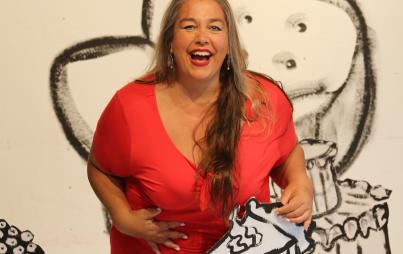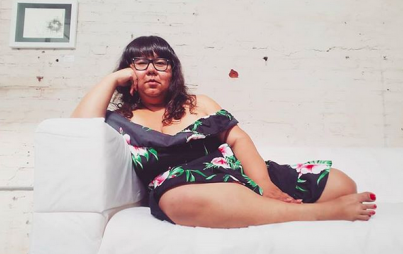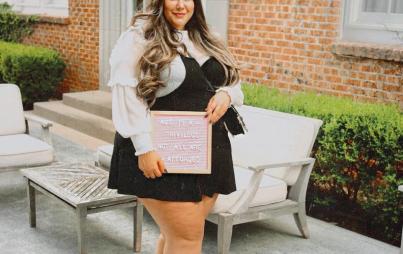
We’re in an age where the notion of “privilege”—that groups of people benefit from unearned advantages based on, say, the color of their skin or their sexual orientation—has finally broken into some mainstream conversations. Hell, recently even Bill O’Reilly, badgered by Jon Stewart, oh-so-grudgingly conceded that white privilege might be, at the minimum, a “factor” in our respective abilities to succeed in America.
But even in this age where calls for people to “check their privilege” and evaluate their views from the perspective of their inherent—and often unacknowledged—advantages are growing increasingly common, there is one dehumanizing discrimination that more often than not goes very much unchecked: discrimination against fat people.
More likely to live in poverty, to be perceived as lazy or stupid, to not be hired—even to lose custody of children or fail to receive adequate medical treatment—fat people in our country contend with innumerable biases. Thinness still reigns supreme as the ideal cultural aesthetic, and those who fall outside of that are all too easily stigmatized.
Fortunately, the world has Amanda Levitt. A fat activist who’s been at the forefront of the movement for years, Levitt trains an insightful eye on the systemic and intersectional roots and manifestations of this insidious discrimination. In spite of endless, hateful trolling and rampant abuse, Levitt is committed to combating the damaging stigmas fat people face. Whether through her more formal academic research, blogging on her personal website, monitoring the "This Is Thin Privilege" blog, or via her sharp Twitter commentary, Levitt devotes herself every day to the creation of a more equitable world, one in which all people feel entitled to their humanity—regardless of their size.
In a passionate, honest and insightful conversation, Levitt filled me in on the roots of her activism, how she deals with terrible trolling and, of course, her dog Itty.
Can you describe your background a bit. What kicked off your activism?
I’ve dealt with fat-shaming and fat stigma since my early teens—really, though, for as long as I can remember. When I was teen, I had an eating disorder and an anxiety disorder. I feared eating in public; it became an ordeal.
A lot of terrible things had happened in my youth—my parents getting divorced, abuse, poverty—and I internalized much of this. I absorbed the notion that if I lost weight, people would treat me differently. I very much put the burden of how people were acting toward me on myself. But then I found some sociology books in high school. I went on a road trip alone around that time, which I spent just processing what I was reading. I started to find the language to understand the things I’d been through—slowly removing myself as the reason bad things were happening to me.
When I was 18, I found Big Fat Blog and it was the first time I discovered that the things I went through weren’t an individual issue or something that was wrong with me, but a much broader one. Something was instead wrong with the world.
I found a lot of answers in the community. Fat stigma is real. The way fat people are treated is wrong. Regardless of someone’s weight they deserve to be treated like a person.
Then when I was 20, I started blogging. The blog started off as more sarcastic and ranty about my personal life, but then grew to encompass the knowledge I was accumulating from books and theory.
Since then I’ve moved outside of my blog to become more active on other social media platforms including Tumblr and Twitter. Both spaces have given me the ability to talk about other issues, build a larger social network and learn a ton.
When you identify as being a fat activist, what does that mean? How is it different from body acceptance?
To me, being a fat activist is about acknowledging that all fat people have the right to their humanity—that is, regardless of their health status or anything else that society has deemed unacceptable.
The difference between fat politics and body acceptance, at least for myself, is that I’m not interested in or care about other people accepting their body or my body. Fat politics is not just about body image and loving your body. Fat politics is about the dehumanization of fat people and the structural/institutional discrimination that is found within our society.
The body acceptance movement has its good points, but I do not feel safe within those spaces. There is a lot of erasure of fat people within body-positivity communities. While many spaces are fat-positive as well, there is still a lot of negative portrayals about fatness that I find to be counterproductive within a lot of the messages that are spread through the movement.
What are the kinds of prejudices and stigmas you’re battling, and how?
There’s discrimination of fat people on a number of levels. On the individual level, there’s interpersonal, person-to-person discrimination—a person making judgments about another based on his or her size.
There’s also structural/systemic discrimination, where institutions and society are biased against fat people. Research has shown that people are less likely to get educational support from their families if they are fat. Fat people are also less likely to be hired and promoted. Studies show we’re perceived as lazy, lacking control, not friendly and diseased. There’s spatial discrimination—not just on airplanes, but also in restaurants and retail stores—where our bodies simply don’t fit. It creates a feeling that our bodies are not welcome in these spaces.
Fat stigma is also gendered: Fat women make $10,000 to $20,000 less than thin women. Fat men make less when they first enter the job market but slowly their weight does not impact the money they make. In many cases fat men, comparatively, make more than very thin men.
Fat people are most likely to be poor and people of color, meaning they are more likely to live in communities where there isn’t access to fresh foods. They are also less likely to have access to safe spaces outside where they can move their bodies. The intersection between race, gender and class becomes incredibly apparent when people take the time to think about where fat people live and the barriers they have due to discrimination.
You’re now pursuing a degree at Wayne State University. What kind of degree is it and how do you envision it informing/supporting your work?
I really enjoy doing research, so I’m staying here for my masters in sociology, then getting my PhD. I like community organizing but unfortunately within fat politics, there’s a slim chance to get a salaried position.
But I’m into researching and being a nerd and think more people need to be doing this work with an eye toward intersectionality, to thinking about how race and gender and class, etcetera, all interconnect.
My thesis is looking at the perception of fatness using troll messages I collected over a year from a blog I help moderate. In the future, I would like to look more at the context in which fat stigma exists in society, through interpersonal interactions. My thesis has really shown how mainstream narratives about marginalized people are reinforced and regulated using social media, but I want to move offline for research in the future.
Your blog is not just academic, but very personal. What inspires you to put such personal things online?
At the end of the day, I’m still a person. It’s hard for me to not talk about my personal experiences—I’m an over-sharer. And I want people to realize I’m a fat person; I’m not discussing mystical beings outside of me. I’m talking about my own experiences, about people I know. I try to humanize myself and, through that, humanize other fat people.
In your writing and on your CNN interview, you discuss how we should be neutralizing the word “fat”—comparing it to how “skinny” or “thin” is used. Can you talk about that a bit?
The language we’re taught to use concerning fatness frames it as being inherently diseased and pathological. It places an emphasis on “different,” on “other,” and suggests that fat people are unintelligent, lazy, out of control and going to die at any minute.
But fatness is a neutral thing. Fat is a descriptor used to describe someone’s body. The term shouldn’t imply that someone is bad, sick, unworthy of humanity. It should just be a word that people use. I want to deemphasize the negative associations we have with it.
I’m not interested in dictating how other people think about or describe their bodies. But I am interested in the history of how this kind of language comes to be. Like the word “homosexual”—it was created by physicians to define queer people as mentally ill, thus there’s been a push away from using hetero/homosexual from the queer community. I want people outside of all these communities to use the terminology people within the community want to use. It returns the humanity to the people being discussed.
One of the things that really struck me about all of the things you discuss is how rampant fat discrimination is at the doctor’s office.
Weight stigma is very real in medicine. There’s the notion that if you just lost the weight, any and every problem will disappear. Beyond that, there’s a lack of access to testing—for instance, with MRI machines. Some people can’t fit inside them and many insurance companies don’t cover open MRIs.
A study last year showed that fat people were regularly given the wrong dosage of chemo drugs, which are given based on a weight range—regardless of actual size. This meant that fat people were more likely to die or relapse than thin people.
Outside of that, we know fat people can be metabolically healthy but refuse to look at social structures and institutions that make fat people at a higher risk of disease. By ignoring it we place emphasis on the body as the problem instead of looking at research that has shown for decades that living in communities without access to health care, high quality foods and safe spaces makes the people living there more at risk for health problems. These are the communities fat people are more likely to live in.
If we created a medical system that didn’t erase fat people and instead worked to treat diseases—not fatness—it could vastly improve the kind of relationship fat people have to medicine.
One of the blogs you moderate is “This Is Thin Privilege.” What does the term mean and how does it fit within an intersectional framework?
Thin privilege, as with all forms of privilege, speaks to how individuals navigate the world differently and gives a context to understand how individuals with privileges benefit from the discrimination marginalized people are forced to deal with. If a thin person goes to a doctor, the doctor won’t just tell them that losing weight will fix everything. When thin people go into a store, they are more often than not able to find something to try on.
Many people get defensive about this and often people with any kind of privilege don’t see or believe they have it. When you don’t deal with discrimination, it’s often invisible to you—your privilege is normalized and you never have to investigate it unless someone flags it for you.
Thin-shaming is a reaction to the fat positive movement and it often continues the marginalization of fat people. All people have to acknowledge how their bodies move through space.
The trolling you see on the various Tumblrs and blogs you moderate is horrifying. You’ve written about trolling being a “disruptive behavior that seeks to shut down a space or conversation”—how do you think society should be addressing it and how do you deal with it on a more personal level?
On a personal level, there are things I’ve had to do for my own security. The reality is that much of what I do and speak on makes me a target, so there are many things I don’t discuss publicly, and I’ve been very selective about who knows everything about my life.

And as for the trolling itself, that’s one of the things I’m researching—how messages from trolls are reinforcing mainstream messages about fatness. I’m doing that by looking at how they are perceiving fat people along with the methods they use to get their message across.
I kept track of the messages I received while monitoring "This Is Thin Privilege" from May 2013 to May 2014. I was one of either three or four people monitoring the site, so I didn’t see the messages other monitors were deleting, but I noticed a huge pattern about how trolls are getting their messages across.
What’s interesting is that people are saying the same things—they’re unoriginal. While many send threats of violence, along with telling us why we shouldn’t run the blog, they are also telling us the same things as people who think they are simply asking us a question or trying to inform us on things they believe we don’t know.
There is a huge grey area and I’m trying to better understand how it is all interconnected.
How has your work evolved over the last eight years?
There have been a lot of big changes. Very few people were online when I first started—a lot of people involved in the fat activist community found each other through online communities like Fatshionista, a livejournal community that allowed people to talk about fat-sized clothing.
Tumblr really took off and got popular in 2011. I was part of that and one of the few fat activists on Twitter in its early days. For the most part, I started off writing in my own world and slowly became more connected with people online through Facebook, Twitter, Tumblr—all of which is huge now.
It’s really exciting that these ideas are bursting outside of just the fat activist community. When I first started tweeting I didn’t have a lot of support from other activists who weren’t fat, but that has slowly changed and has made the connections I have online amazing. I’m hopeful about all the activism that is happening on and offline, along with the scholarly movement that’s happening, too—the idea that fatness is something worthy of academic inquiry has grown significantly in the last five to 10 years.
You can follow along with Amanda's work on her website, fatbodypolitics.com, her Tumblr, and on Twitter @FatBodyPolitics.






